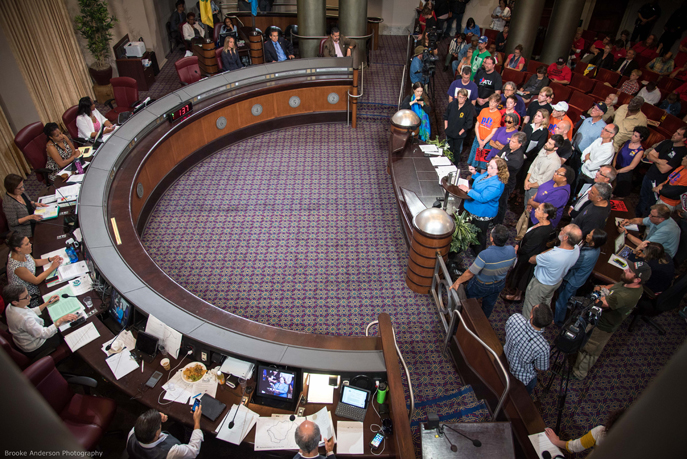Over a year after first discovering deceptive plans to export coal through the Oakland Army Base (OAB), the Oakland City Council voted unanimously on July 19 to ban coal and petroleum coke (petcoke) storage and handling in the city. This vote comes on the heels of a June 27 Oakland City Council unanimous vote wherein the Council initially passed a strong ordinance banning coal/petcoke handling and storage in the City of Oakland. Following the second Council vote—the normal procedure for the passage of an ordinance—the ordinance becomes law immediately.
The story of coal in Oakland reads somewhat like a soap opera.
The former Oakland Army Base, which has been undergoing redevelopment since 2000, is on public land owned by the City of Oakland. The Army Base redevelopment is the product of years of collaborative work by government agencies, labor unions, and community groups like West Oakland Environmental Indicators Project. As one part of the larger Army Base project, the proposed Oakland Bulk and Oversized terminal was touted to the community and to decision makers as a terminal to ship grain and wind turbines. The project has received hundreds of millions of public dollars, including over $242 million in state Trade Corridor Improvement Funds intended to improve air quality.
Through a series of public record requests sent by the Sierra Club, and an article in a small Utah newspaper about a secretive backdoor $53 million funding allocation made by the Utah Community Impact Board (CIB) to the Oakland terminal to ship coal, community groups learned about plans to bring coal through the Oakland Army Base despite the developer’s earlier public denials about his intent to ship coal. The Utah funding deal was brokered by the then-Chair of the Utah Transportation Commission who was simultaneously working for a private bank that stood to profit from the deal. Even after major criticism about the potential legal issues and conflicts of interest associated with the Utah CIB funding, Utah passed a bill to invest over $50 million in the Oakland terminal in the 11th hour of its legislative session.
With this information in hand, a diverse coalition of groups including environmental justice groups (West Oakland Environmental Indicators Project, Communities for a Better Environment, Asian Pacific Environmental Network), environmental non-profits (the Sierra Club, Earthjustice and San Francisco Baykeeper), labor unions (SEIU 1021, ILWU Longshoremen, Alameda County Labor Council, among others), faith leaders, and individual community activists (No Coal in Oakland) came together to pressure the Oakland City Council and state legislators to make the right decision: keep toxic coal and petcoke out of Oakland while remaining committed to developing the former army base in a way that will create safe jobs for local residents and not jeopardize the health of workers at the terminal.
Adjacent to the site of the proposed coal export terminal lies West Oakland, a predominantly African-American and historically underserved community that is plagued by asthma, pneumonia, emphysema, and heart disease as a result of its proximity to industrial areas and highways. Residents of West Oakland are exposed to disproportionate amounts of airborne toxins, and are more than twice as likely to go to the emergency room as compared with other residents of Alameda County. Despite the glaring evidence of the negative health impacts from coal on a community already overburdened by pollution, and overwhelming community opposition (76 percent of Oaklanders oppose coal, and 96 percent oppose the use of public funds for the project), the developers continued to insist that they must ship coal.
The Oakland City Council held a hearing to assess the public health and safety risks associated with coal and petcoke on September 21, 2015. The council chambers filled with students, members of the faith community, business leaders, doctors, public health officials, concerned residents, and many others who testified to demand action. Since that hearing, the City Council, Mayor, and City Administrator have been evaluating the evidence presented by both sides, and retaining their own consultants, Environmental Science Associates and Dr. Zoe Chafe, to assist in that evaluation. As the culmination of the year long process, on June 27, 2016, the City Council held a follow-up hearing to propose a ban on the storage and handling of coal and petcoke based on health and safety concerns.
The City of Oakland's ordinance, co-sponsored by Councilmember Dan Kalb and Mayor Libby Schaaf, is the most comprehensive coal and petcoke ban passed to date in the United States. Citing health and safety concerns like coal dust and climate change, the ordinance bans essentially all coal storage and handling in the city, with minor exceptions. Oakland also passed a companion resolution applying the city-wide ordinance to the former Oakland Army Base.
On a separate track, California State Senator Loni Hancock has proposed two bills, SB 1277 and SB 1279, that affect state funding for coal projects and require environmental review if a coal terminal were to be built at the Army Base. Those bills are also heading toward the Assembly floor for a vote later this summer.
For now it seems the voices of Oakland residents have been heard loud and clear: there will be no coal in Oakland.
